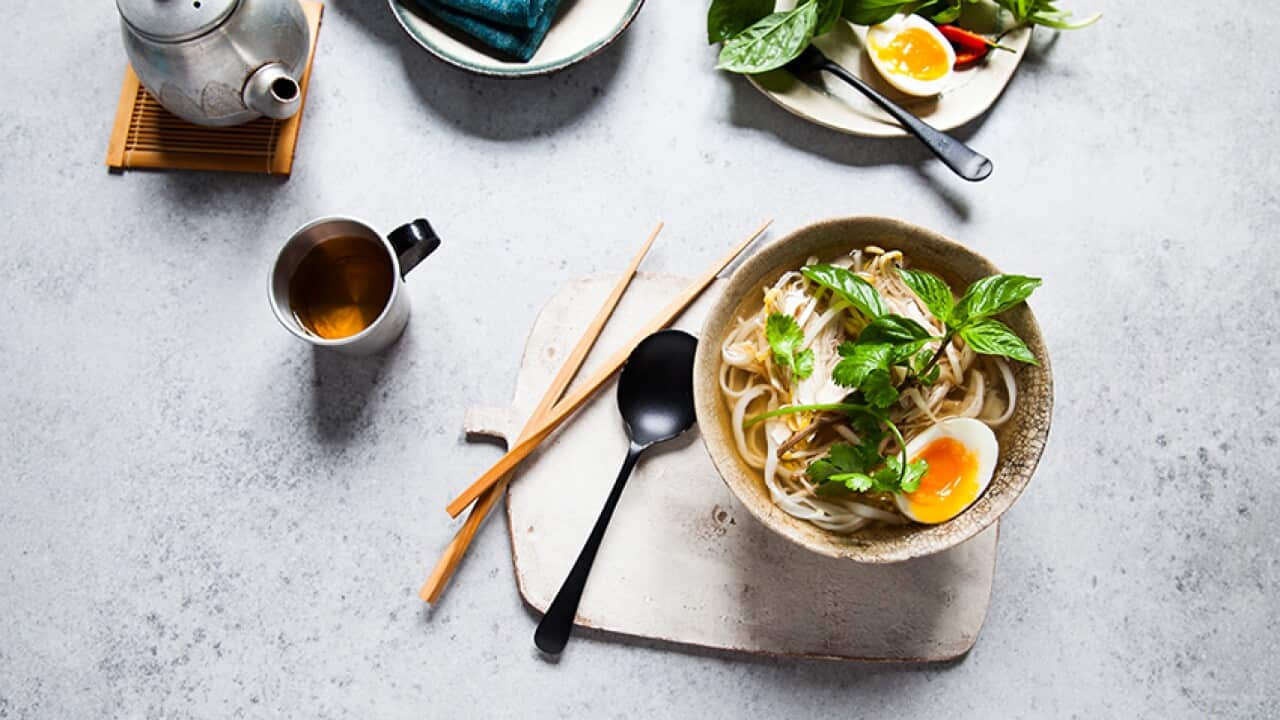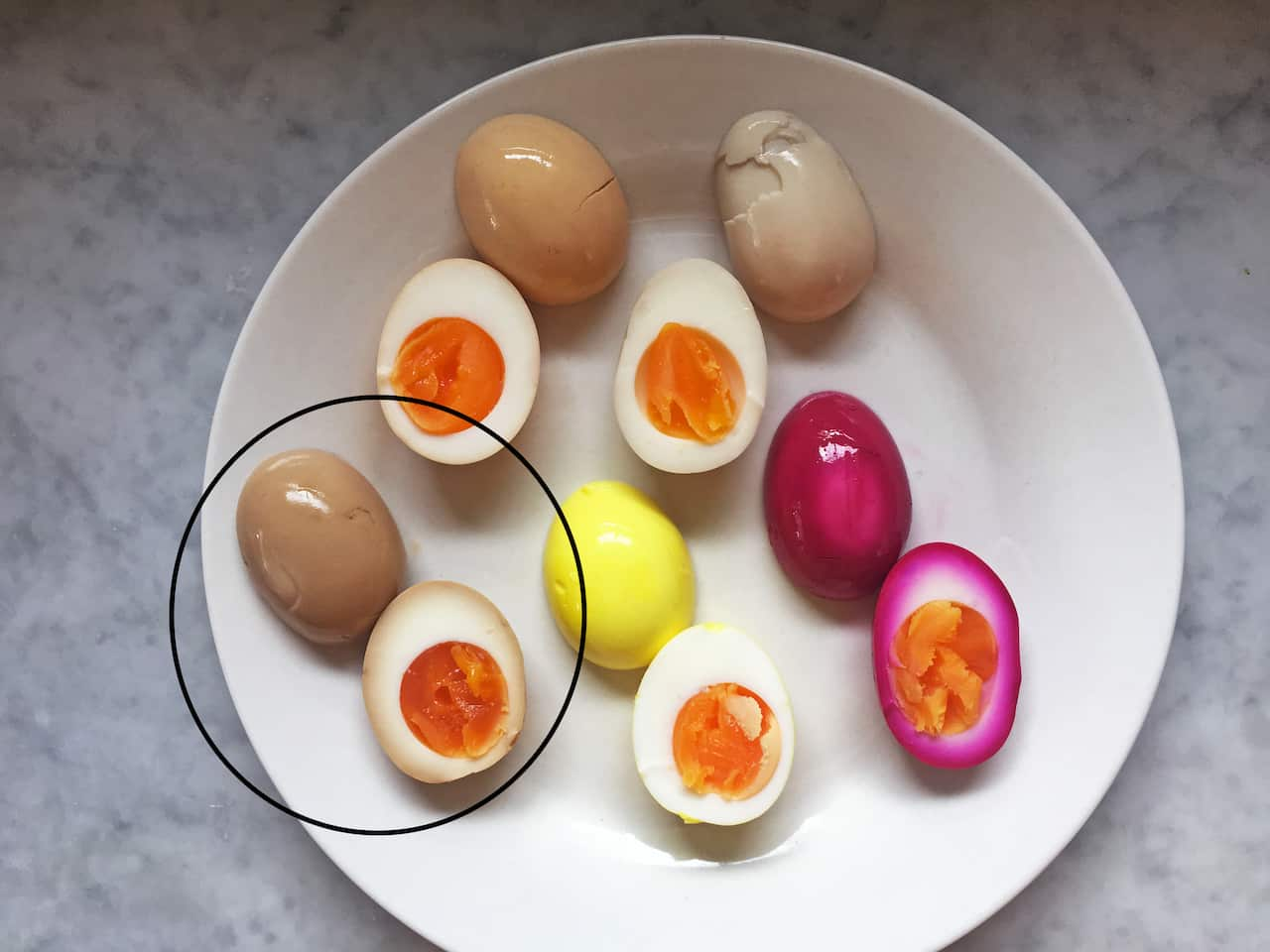Who doesn’t love a ramen egg? Salty and almost cured, any remnant of egg pong disappears. Surprisingly, these eggs are really easy to make. Done so by placing a soft-boiled egg into a soy sauce-based brine to cure for anywhere between one to ten hours.
With this in mind, I thought, ‘why can’t I ‘pickle/cure/brine’ eggs in anything salty and acidic? Then, the eggsperiment was born.
Using a combination of flavour base + salt + vinegar, I pickled eggs in five different liquids to see what would happen. Here are the results:

It tasted exactly like hot sauce. Source: Camellia Aebischer
Spicy and vinegared, hot sauce and eggs are a match made in heaven. To my base of hot sauce, I added water, salt, white vinegar and a bunch of smoked paprika. After two hours, the eggs took on almost no colour (sigh!) so I left them in the brine overnight. Still, in the morning there was very little sign of redness, but they tasted JUST like hot sauce. Strong breakfast vibes. The spice didn’t come through, but they were full of flavour and would be great on any breakfast plate. Fish sauce
Fish sauce

Best tell everyone what they're in for with these before serving. Source: Camellia Aebischer
Not dissimilar to soy sauce, fish sauce seemed like a worthy sub-in for egg pickling. I added rice vinegar, water and a little sugar to balance out the intense flavour. After two hours, these turned out delicious, albeit very pungent, but they would be at home garnishing any South East Asian-style rice, noodle or salad dish. The eggs turned an unpleasant light brown hue, so next time I’d make them with a few splashes of soy, so they don’t just look off.
READ MORE

Chicken phở with soft-cooked egg

No prizes for guessing which one this is on the plate. Source: Camellia Aebischer
Next time you open a tin of (or pickle your own) beetroot, give this one a whirl. I used straight canned beetroot brine which was quite sweet, so next time will be adding some extra salt and spices for flavour. They tasted pretty strongly of the beetroot after two hours in the mix, but you can go as little as 15 minutes for a nice purple tinge.
These would look great on a slice of avocado toast. Since we’re all tucked away inside why not bring out the big guns for weekend brunch. Turmeric
Turmeric

Sadly the turmeric didn't penetrate the whites, but it had a nice pickle flavour. Source: Camellia Aebischer
Since turmeric has little flavour, I mixed a bit of it into a standard pickling mix of 1:1 vinegar and water plus a little sugar and salt. Despite its ability to deeply stain hands, wooden spoons and white clothing, after two hours the turmeric barely made a dent on colouring the egg.
I left this one overnight and it became a fun bright yellow on the outside which sadly didn’t absorb into the whites inside. My dreams of creating a completely yellow egg have been shattered. Soy eggs
Soy eggs

Go and make these now - they are SO good. Source: Camellia Aebischer
Saving the best for last, the classic soy egg. This one turned out great. If you’ve ever had the egg in a bowl of ramen you’d know. It’s seasoned all the way through and has a pleasant light soy flavour. I used these to make a soy egg breakfast taco with some avocado, coriander, chilli and pickled radishes. Might just start a rotational batch so I never run out.
READ MORE

Tonkotsu ramen
How to make soy eggs
- 6 eggs
- 100 ml water
- 150 ml light soy sauce
- 50 ml black vinegar (Chingkiang vinegar) or rice wine vinegar
- 1 tbsp sugar
Bring a pot of water to a boil and cook eggs for 6-7 minutes (closer to six for a runnier yolk and closer to seven for firmer but still golden and soft). Place eggs straight into a bowl of ice water to stop cooking.
Mix water, soy, vinegar and sugar in a large jar.
Peel eggs and place in a jar with soy mix. Let rest for between 1-3 hours. Alternatively, double the amount of water added and leave them overnight.
The longer you leave them, the stronger and saltier they’ll be. Don’t store them in the brine or they will end up curing and becoming intensely salty.
Remove from brine and place in an airtight container (you can save it for another batch). These will store in the fridge easily for a week as the curing extends their shelf life.







